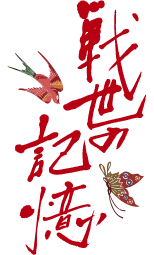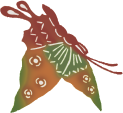
“Experiences of war in Taiwan and the Ryukyu Imperial Remaining Force”
“Experiences of war in Taiwan and the Ryukyu Imperial Remaining Force”
Chikou Nakamura, 92 years old
(Place of birth: Uezu, Kumejima Village, Okinawa Prefecture)
When I turned 20 years old, I joined the Japanese Army. I passed the strict military eligibility inspection and went immediately to the army. Since we had a very militaristic education in schools then, I think I had a strong inclination to serve the country.
In 1943, I was scheduled to be assigned to the corps in New Guinea after being sent over to Taiwan first, but never made it to New Guinea as the ship I was supposed to board was sunk.
The Okinawa corps, Tama corps for example, were to protect Okinawa, but we were employed to be assigned to the Southern Expeditionary Army Group. I was assigned to the 9th Army Division, based in Kanazawa but which was making a temporary stop in Okinawa then. I was scheduled to be sent to Taiwan first, then to New Guinea as a member of the 9th Army Division.
(My duty assignment in the corps)
My duty assignment was to provide service at the base for the special attack force in Giran. There were two bases, one on the south side for the Zero fighter plane force and another on the north side for the special attack force. I was stationed there as a guard doing three shifts per day on a one-week basis. Since I was also stationed as a guard for the Governor of General of Taiwan in Taipei, I usually left Giran in the late afternoon and was in Taipei in the next morning.
(The final stage of the war)
When the US Armed Forces landed on Okinawa, we were in Taiwan and there was nothing we could do. The special attack force flew from the base in Taiwan to Okinawa as well. The battleship Yamato sailed out with one-way fuel from the main island of Japan and I thought we all would be going for the special attacks eventually. However, since the special attack planes had only one-way fuel and many of them were shot down, we did not have enough air planes for the followers to fly out.
(After the war)
When the war was over, we were in Keelung. There was so much rain in Keelung, I felt like it was raining 365 days a year. It, I believe, was the reason why many people got sick with sickness such as malaria.
The war was over in 1945, but we could not get back to Okinawa for the following two years. Although the soldiers from the main island of Japan were demobilized and returned home one after another, we, the soldiers from Okinawa, could not return home because Okinawa was occupied by the Americans. Coming back home was not easy for the civilians either, because so many ships were sunk and not many evacuation ships were available.
Then, our corps moved to Tainan to support ourselves. There was a company called the Nippon Sugar Refining Company which had tens of thousands of hectares of land. We planned to grow some farm products there to support ourselves. We, the infantry division, moved first followed by the military police division and the flying corps. Although all our weapons were under requisition, we, the infantry division, were on guard with wooden swords in our hands all through the night because we had some local farmers who frequently made night attacks on us with hatchets in their hands. They even set fire to some of our houses and attacked us. They thought that we would take their farms away from them, I believe.
(Before the demobilization)
In the name of Okinawa, the corps called the “Ryukyu Imperial Remaining Force” was organized. It was a corps of 170 or 180 soldiers and I was one of them. Our main duty was to help the evacuees. We had the Inspection Division to inspect the evacuation ships, the Boarding Division to help the evacuees board the ships and the Guarding Division to guard the evacuees. We also helped people remove rubble of the houses destroyed by air raids and carry the dead bodies to burn them.
We had no tea to drink, no hot water and no bathroom. We had a miserable life carrying the washbowls with our towels in them and asking the local people for some hot water.
Speaking about the Ryukyu Imperial Remaining Force, there were two men, Seisaburo Nagayama from Iejima and Matsuei Yamanoha from Nago, who came to me and said, “Let’s organize the Ryukyu Imperial Force and return everyone from the main island of Japan home. Please stay and help us to the last.” This was the reason why I joined the Ryukyu Imperial Remaining Force and decided to stay until the last minute.
(Looking back at the war)
If possible, I want any issues to be resolved by a discussion and negotiation. War makes people kill each other. I wish that no one ever starts war again and we should never go into war.
Chikou Nakamura, 92 years old
(Place of birth: Uezu, Kumejima Village, Okinawa Prefecture)
When I turned 20 years old, I joined the Japanese Army. I passed the strict military eligibility inspection and went immediately to the army. Since we had a very militaristic education in schools then, I think I had a strong inclination to serve the country.
In 1943, I was scheduled to be assigned to the corps in New Guinea after being sent over to Taiwan first, but never made it to New Guinea as the ship I was supposed to board was sunk.
The Okinawa corps, Tama corps for example, were to protect Okinawa, but we were employed to be assigned to the Southern Expeditionary Army Group. I was assigned to the 9th Army Division, based in Kanazawa but which was making a temporary stop in Okinawa then. I was scheduled to be sent to Taiwan first, then to New Guinea as a member of the 9th Army Division.
(My duty assignment in the corps)
My duty assignment was to provide service at the base for the special attack force in Giran. There were two bases, one on the south side for the Zero fighter plane force and another on the north side for the special attack force. I was stationed there as a guard doing three shifts per day on a one-week basis. Since I was also stationed as a guard for the Governor of General of Taiwan in Taipei, I usually left Giran in the late afternoon and was in Taipei in the next morning.
(The final stage of the war)
When the US Armed Forces landed on Okinawa, we were in Taiwan and there was nothing we could do. The special attack force flew from the base in Taiwan to Okinawa as well. The battleship Yamato sailed out with one-way fuel from the main island of Japan and I thought we all would be going for the special attacks eventually. However, since the special attack planes had only one-way fuel and many of them were shot down, we did not have enough air planes for the followers to fly out.
(After the war)
When the war was over, we were in Keelung. There was so much rain in Keelung, I felt like it was raining 365 days a year. It, I believe, was the reason why many people got sick with sickness such as malaria.
The war was over in 1945, but we could not get back to Okinawa for the following two years. Although the soldiers from the main island of Japan were demobilized and returned home one after another, we, the soldiers from Okinawa, could not return home because Okinawa was occupied by the Americans. Coming back home was not easy for the civilians either, because so many ships were sunk and not many evacuation ships were available.
Then, our corps moved to Tainan to support ourselves. There was a company called the Nippon Sugar Refining Company which had tens of thousands of hectares of land. We planned to grow some farm products there to support ourselves. We, the infantry division, moved first followed by the military police division and the flying corps. Although all our weapons were under requisition, we, the infantry division, were on guard with wooden swords in our hands all through the night because we had some local farmers who frequently made night attacks on us with hatchets in their hands. They even set fire to some of our houses and attacked us. They thought that we would take their farms away from them, I believe.
(Before the demobilization)
In the name of Okinawa, the corps called the “Ryukyu Imperial Remaining Force” was organized. It was a corps of 170 or 180 soldiers and I was one of them. Our main duty was to help the evacuees. We had the Inspection Division to inspect the evacuation ships, the Boarding Division to help the evacuees board the ships and the Guarding Division to guard the evacuees. We also helped people remove rubble of the houses destroyed by air raids and carry the dead bodies to burn them.
We had no tea to drink, no hot water and no bathroom. We had a miserable life carrying the washbowls with our towels in them and asking the local people for some hot water.
Speaking about the Ryukyu Imperial Remaining Force, there were two men, Seisaburo Nagayama from Iejima and Matsuei Yamanoha from Nago, who came to me and said, “Let’s organize the Ryukyu Imperial Force and return everyone from the main island of Japan home. Please stay and help us to the last.” This was the reason why I joined the Ryukyu Imperial Remaining Force and decided to stay until the last minute.
(Looking back at the war)
If possible, I want any issues to be resolved by a discussion and negotiation. War makes people kill each other. I wish that no one ever starts war again and we should never go into war.


